Text
146 notes
·
View notes
Text
139 notes
·
View notes
Text
304 notes
·
View notes
Text

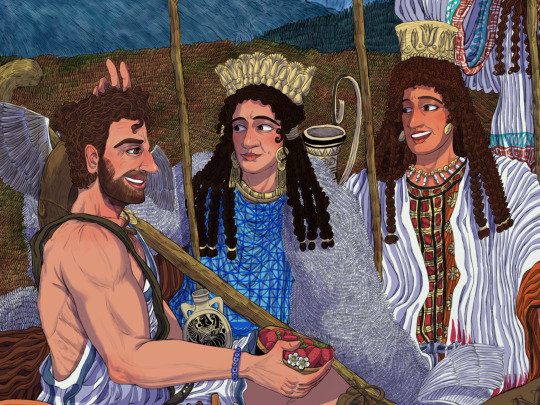

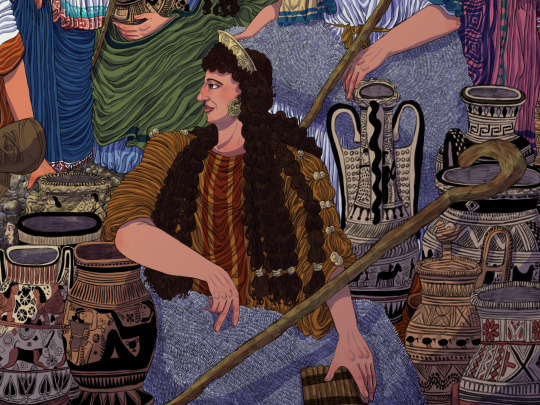
At the foot of Mt. Kyllini 🌳🏞
A commission that I made for @bfire92, @hermes-left-nut and other future Hermes lovers alike. Prints of them will be available as high quality glicée prints in my Inprnt shop soon, or as multiple forms of accessories at Redbubble in case if you’re looking for more alternative and experimental choices.
The background was based on the actual Mt. Kyllini itself, Hermes’ birthplace in Corinthia, the Peloponnese region of Greece; while the surrounding Pleaides (including his mother, the eldest Maia and his aunties Electra, Taygete, Alycone, Celaeno, Merope, Sterope) were based on Archaic Greek “Kore” statues, whose hairstyles & clothing often seemed to be inspired from neighboring Egypt and the Middle East, flavored with a bit earlier Minoan/Mycenaean that still remained despite the catastrophic Greek Dark Ages. (Rather than the usual styles of “Ancient Greece” we often know of & associated with today.)
#ancient greek#hermes#mercury#the pleiades#mount kyllini#peloponnese#artwork#artist#art#artiists on tumblr#davidluongart#davidluong
97 notes
·
View notes
Text
Seeing a post that you know a mutual will like and reblogging it to add enrichment to their dash like giving a tiger in a zoo a cardboard box
69K notes
·
View notes
Text
#smyrna#ancient#hellenistic#Greek#anatolia#athena#homer#culture#city#temple#Zeus#hermes#dionysos#Eros#heracles#hestia#greece#ancient greece#news#cultural news#history#ancient history#ancient greek culture#archaeological sites#archaeology#ancient ruins#ancient monuments#ancient greek temple#modernish ruins#ruins
0 notes
Text
0 notes
Text
0 notes
Text
0 notes
Note
Hello!
I was wondering if you could point me in the direction of modern views on hair and hair binding in Greece. I tried finding information on modern views myself but I have not found anything. I really loved your posts on modern views for veiling.
Thank You!!!
When it comes to Greek women, veiling and hairbinding and head covering is simply very old and folky fashion, and only part of our traditional clothing. In the older times covering your hair was a sign that you were married but you could also cover it (the hairbinding happened then) because you didn't want hair to get on your face while you were working in the fields or fall in the food you're preparing.
Today since uncovered hair is not considered promiscus behavior and hair is just hair for us, often Greeks wonder why other cultures or religions (or even our own clergy within its circles) can give such erotic and/or beautifying significance to women's hair to the point that covering it is a sign of modesty. (We gave hair some such significance in the olden days, like... before 1920 for most cases). Today hair is a beautiful part of a woman but just as ordinary to show as her hands and face.
I'm not sure if the head covering for women became more prominent after Muslim Turks conquered the Eastern Roman empire. But as you saw even before the Roman Empire women veiled, too, and I've seen that some Greek orthodox women covered their hair in the Byzantine empire as well.
Of course here I must mention that Greek Orthodox nuns and priests and monks are covered from head to toe in black even today. The difference is that men of the clergy must keep their hair somewhat long but tied back. In their official attire they usually wear a cap and sometimes it's long enough (when it's a mitra) to cover all their hair. But I don't think that for the men this happens because of modesty, compared to women.
Just the other day I saw a Greek Orthodox nun on the street who also covered her face, save for her eyes (first time I saw that). Before joining the clergy willingly they know what the attire is and I assume they have no problem with it. But most Greeks do find it restricting as an idea. I haven't heard of Greeks offending nuns because they were covered, though. They have offended Muslim women because of islamophobia, something that I don't subscribe to, but I'd like to present the situation in Greece regarding this type of religious covering.
Many Greeks fear that if they encourage the Islamic headcovers, Islamic culture(s) will become so prominent in the country that the overwhelming majority of Greek women, who don't veil, will be subjected to harassment by the Muslim men who will consider them immoral. Mandatory and Non mandatory Islamic headcovers have been connected in the ethnic collective mind to oppression, because of recent anti-islamic rhetoric but also because of Greeks' (and Christians in general) very recent history of oppression under the Muslim Turks and Arabs. And of course Erdogan is getting bolder every year, making Greeks more afraid of the Turkish nation (and hence their traditions, clothing, and religion which is Islam).
It's also weird to Greeks when foreign Hellenic polytheist women want to veil because of religion, because veiling for religion is also an old notion for Greek women (more so the reasons they veiled in antiquity). Even the grandmas go to church with their hair showing. Some might veil/cover but I don't remember seeing them tbh. (Maybe if they cover they are veeery old and widowed possibly).
Generally head covers can be considered symbols of slavery of the mind and body for the reasons due to how many Greeks view the Islamic nations but also because it is a very outdated practice. In the first "modern" years when Greek women past their teen years strolled around with their head uncovered they were challenging old systems of purity and sexuality. It was their own revolution, although we don't hear much about it because the most recent revolution (following the free hair) was the skirts above the knee. From the comments I've seen over the years from Greeks I could describe it as the society seeing it as "needlessly going backwards" for a Greek woman (or any woman) outside the clergy to veil for cultural or religious reasons. They just don't see the need to cover the hair just as women from some isolated African tribes don't see the need to cover their breasts. And suddenly introducing a cover can change the moral image women who don't cover have about themselves in an uncomfortable way.
The headcover, as I mentioned, used to be a symbol of a woman "belonging" to a man (only her man should see her hair long and untied) or being "mature and contained" because of her covered hair and that's considered a backwards notion today in Greece. It's also a fashion choice very associated with some rare isolated widowed grandmas so... not a good look 😅 When Greek women had to cover their hair when they entered a mosque in their travels they've told me "I felt like a grandma", to give you some examples.
Anyways, that's a second reason that the overwhelming majority of Greek women wouldn't choose to veil today. They do it only when they wear traditional clothing and then the headscarf doesn't have any negative meaning for them in this context.
Interestingly enough I think that if a Hindu woman wore a sari and her hair were covered she wouldn't be harassed, or that she would be less harassed compared to a visibly Muslim Pakistani woman. That's because of Greece's fear of nations who are mostly Islamic. Roma women in Greece also cover their hair often but it's seen as part of their ethnic attire so it's not a point of discussion. (For many Muslim women of the head cover is of course also traditional but in this case Greeks give more importance to the religious reason they wear it).
Obviously I don't think anyone should take off a traditional and/or religious headcover from anyone but I wanted to explain the thought process behind how many Greeks think about different types of headcovers.
I tried to explain things as thoroughly as possible but if I have missed or misrepresented something let me know, and add on this post if you have different experiences than mine!
25 notes
·
View notes
Text
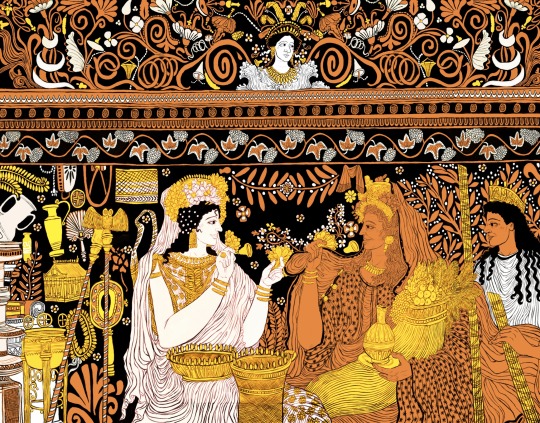

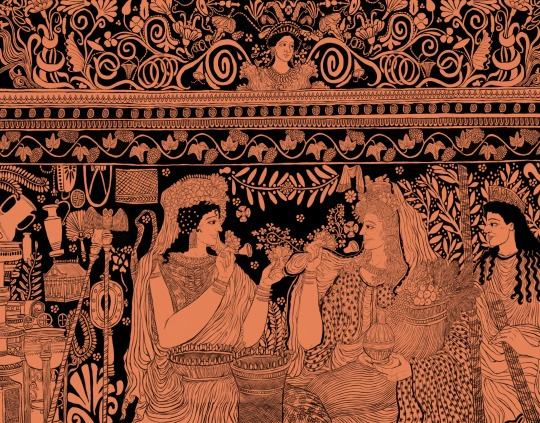
The coming of spring and summer. 🌼🌸🌿🏛
“Then bright-coiffed Hecate came near to them, and often did she embrace the daughter of holy Demeter: and from that time the lady Hecate was minister and companion to Persephone…” -Hymn 2 to Demeter, translated by Hugh G. Evelyn-White, Ed.
For the fans of the stories revolved around Demeter, the Greek goddess of harvesting agriculture (crops, grains, food and the Earth‘s fertility) and her spring daughter, Persephone out there, along with her accompanying goddess, Hekate of the crossroads, night, moonlight, ghosts and witchcraft; here are some illustrations that were inspired from the style of Greek colonies in Magna Graecia, Southern Italy, and other simpler pottery variants from mainland Greece and its islands.
#demeter#persephone#hecate#ancient greek pottery style inspired#apulian greek pottery#davidluongart#art#davidluong#artist#artists on tumblr
1K notes
·
View notes
Text
Something for Dionysia + modern-day music recommendations (?!!) below



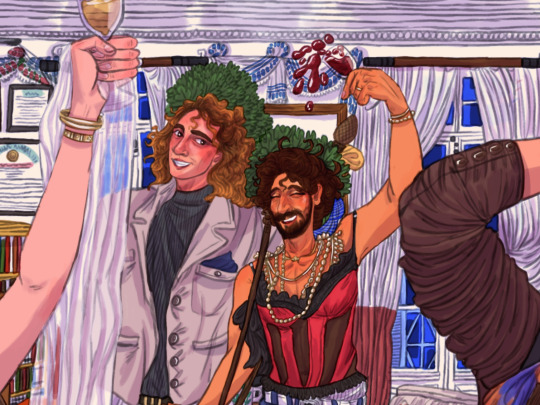

A bit of full disclosure here, so lately, I had been drawing this since all of the “climate changes” & “casualties of forest fires” that happened within all of my Greek friends and the country of Greece this year. And on a bit of positive note, the “lesser-known” and the more ancient festival of “rural Dionysia” are going to come soon, in the month of Poseidon (roughly corresponding to the time between modern-day December and January) - contrasting with the more popular and exuberant “City/Great Dionysia” that often celebrate in urban metropolitan cities (such as Athens or Eleusis) in the spring. (Even though a lot original and special festival customs often happened on the outdoors , you can say that “it’s 2021 and the Greek gods themselves are willing do it inside for a change; amidst the COVID-19 pandemic. Their own version of Dionysia would be much more homely and simple.”)
According to a lot of sources, “while only different in form and presentation, both Rural and City Dionysia festivals was celebrated with a large procession in which men carried a phallus and the phallus-shaped cakes. Revelers and singers were also a part of the procession. An image representation of the Dionysos was also included to represent his coming to the area. The festival also included various types of stage plays (satirical, tragedies, and comedies) and the playing of many lighthearted games.” While a lot of archeologists and historians had been pinpointed that “City Dionysia” to 6th century BC Athens during the tyranny of Peisistratos, they can’t finding a lot of answers for the older ancient one- despite knowing it was originally a rural festival of “the harvesting and celebration of wine” in the Eleutherae of the Attica region, and it might perhaps not even associated with the god Dionysos at all.
Modern-day socio-cultural remnants of these two Dionysia festivals can still be found in a lot of places of modern-day Greece, albeit celebrating and varying differently in each city/region. (Such as the “Phallephoria” festival that recently been widely celebrated by the Hellenic Polytheistic community, “Labrys” in Athens in the mid-2010s, for the first time after 2000 years; the strange but weirdly ecstatic “Bourani” festival of the small Greek town of Tirnavos, near Thessaloniki; and the “Goat festival/dancing carnival” of the island of Skyros, etc. ) And for me about my version of the Greek gods and goddesses? I just imagine them as 21st century average Greeks who just going all of the same personal shit that mortals did. They would be the one I would love to have a Vietnamese “bánh mì” and “cà phê sữa đá” with in the morning; and maybe having tons of alcoholic drink and go clubbing at night. Here are some of the playlists of songs that would fit with each god, and of what I guess of what a modern-day Eastern European/ Balkan “Dionysian rave nightclub party” style would look like? Since it does coming from a lot of very diverse genres that might have Eastern European roots/origins? (Edit: To many Greek Tumblr users and the ones who come from Eastern Mediterranean who happened to be interested in Greek myths as well, feel free to chime in by reblogging and sharing your own playlists.✌️)
Ares’ playlist: Out of all the gods in the Olympian pantheon, I’m feeling most relatable and “at home” with him the most, the god of war and courage unironically. (Have “Greek dad/uncle” vibes to him, to be honest.) I might be personally biased since I might have showing Ares in a much more positive light/watering him down from the usual pop culture “bloodthirsty warmonger” stereotype ; but hey, here are some late 90s-early 2010s nostalgic Eurovision-style classic trance and heavy bass music that I thought fits the god ‘s image so well. (Since “all is always fair in love and war”, right ?)
Natalie Imbruglia - Torn
Gareth Emery feat. Christina Novelli - Concrete Angel
Gareth Emery - Elise
Gareth Emery - Sanctuary ft. Lucy Saunders
Alice DJ - Better Off Alone
O-Zone - Dragonstea Din Tei
Swedish House Mafia- Don’t You Worry Child feat. John Martin
BBE - 7 days and one week
100 gecs - xXXi_wud_nvrstøp_ÜXXx (feat. Tommy Cash and Hannah Diamond) ( This is considered to be hyperpop/P.C. Music, but it still fits with a lot of the old-school early 2000s dance music vibes so well)
Joel Corry X RAYE X David Guetta -BED
Aphrodite’s playlist: As the goddess of love, sexuality, passion, procreation and beauty, I’m feeling that she does listen to a lot of classic-modern day Western European disco and pop, from ABBA, Madonna to Kylie Minogue; and maybe mixing with modern day Eastern European/ Balkan nightclub house music from times to times.
Benny Benassi - Gimme! Gimme! Gimme! (Royal Gigolos Club Mix)
Rina Sawayama - Commes Des Garçons (Like the Boys)
Minelli - Rampampam (KEAN DYSSO Remix)
INNA - Flashbacks
INNA - Oh My God
Shygirl - SIREN (Basement Jaxx Cruise Remix)
Shygirl- TASTY (Boys Noize Remix)
Kylie Minogue - In Your Eyes (A-Mase & Sharliz Cover Remix)
Example - All Night
Example - Click
Apollo’s playlist: As the god of the light in the sun, oracles, arts, knowledge and poetry, as well as herds, flocks and protector of the young; he definitely does give me a lot of “dark academia” lifestyle, but much more like “a professional conservative man” and minus “the western Eurocentric view of the world, romanticization of unhealthy coping mechanisms, debauchery, etc.” that everyone within this aesthetic community often accidentally falling into. (I myself might be considered “the kid from the streets” with “the nightclub lifestyle”, but at least I do know what a perfect studying environment is. /s) So maybe tons of classical music sampled and mixed with modern-day music genres (such as electronic, hip-hop, bass, trap, and techno, etc.) might fit him the best?
Calvin Markus - One Fell Swoop (Vivaldi Remixed)
Apashe - Time Warp (feat. Sami Chaouki)
Apashe - Good News
Apashe - Uebok (Gotta Run) feat. Instasamka
Apashe - Behind My Eyes (feat. LIA)
Apashe - Dies Irae (feat. Black Prez)
Apashe - Lacrimosa
Apashe & Slumberjack - Legend (feat. Wasiu)
This cover of “Storm/ Vivaldi’s Summer ‘Presto’ ” by British violinist Vanessa Mae
Apashe - Work (ft. Vo Williams)
Dionysus’ playlist: As a god for not only the celebration of wine itself (including the processes of grapeharvesting, winemaking, and wine) fruitfulness, vegetation and fertility, but also the ritual madness/ religious ecstasy around it (through forms of arts and theatre) and being the protector of a lot of marginalized groups in the formal polarizing conventional society. (Especially during the Ancient Greek time, maenads are mostly consisted of slaves, women and non-citizens, etc.) For me, maybe the modern-day maximalist and exaggerated sounds of “hyperpop/P.C. music” tracks do fit him the most, with a tons of experimental musicians such as Arca and the late-passing SOPHIE. (Whom often used the platform to experiment with the gender representation of their voices, through the genre’s emphasis of vocal modulation.)
Arca and SOPHIE - La Chiqui
Arca - Mequetrefe
Arca - Time
The whole music tracks from SOPHIE’s “OIL OF EVERY PEARL’S UN-INSIDES” album + all of the remixed tracks (side 1 + side 2)
SOPHIE - Whole New World (SOPHIE and Doss Remix)
SOPHIE - It’s Okay To Cry
Ariadne’s playlist: Consisted of 90s-early 00s glam rock/punk, with a bit of mixing with hyperpop genre (from Dionysus.) and a tinge of sadness and melancholy?? (Considering the circumstances with her early life living with her parents in Crete with the mission of guiding the heroes to slew her half-brother, the Minotaur; resulted in later being stranded in the island of Naxos and abandoned by her lover, Theseus.)
Charli XCX - Silver Cross (A. G. Cook Edit)
Younger Younger 28s- The Next Big Thing
Sega Bodega & Dorian Electra - Teenage Dirtbag (Cover)
Planet 1999 - Party (A. G. Cook, Baseck Remix)
Hannah Diamond & Danny L Harle - Part of Me
Hannah Diamond - Make Believe
Hannah Diamond - Love Goes On
SOPHIE - JUST WE LIKE NEVER SAID GOODBYE
Everything But The Girl - Missing
Arca - Afterwards feat. Björk
Hermes’ playlist: Currently one of the Greek gods that I have the most extreme love-hate relationship with, the most. “Hard-on-the-edge” and “fast-paced” Eastern European techno/hardbass (and other recent experimental genres such as the ones from Shygirl, combining genres of “hip hop”, “house”, “U.K. grime” and “deconstructed club music” together) might fits with him the most, due to his still-relevant image with our modern day “workaholic hustle culture” of “rise and grind”, “live fast die young”, and “fast trendy fashion styles.”
IN IN IN - ZEBRA KATZ
LICK IT N SPLIT- ZEBRA KATZ (feat. Shygirl)
Tear The House Up - Hervé x ZEBRA KATZ
Shygirl feat. Slowthai - BDE
Shygirl - LENG
COBRAH- GOOD PUSS
Quay Dash - Queen Of This Shit
SOPHIE, Shygirl and Clockwork Venus- SLIME /BM
Arca x ROSALÍA & Travis Scott - TKN (Arca Edit)
DJ Blyatman & Russian Village Boys - Cyka Blyat
#alcohol cw#drugs cw#ancient greek#modern day greek mythology#greek traditions and culture as well#rural dionysia#city dionysia#dionysia#ares#aphrodite#davidluongart#artwork#art#artists on tumblr#davidluong#I know I am late#but this is amazing#so pretty#i love it#so much to look at
111 notes
·
View notes
Photo
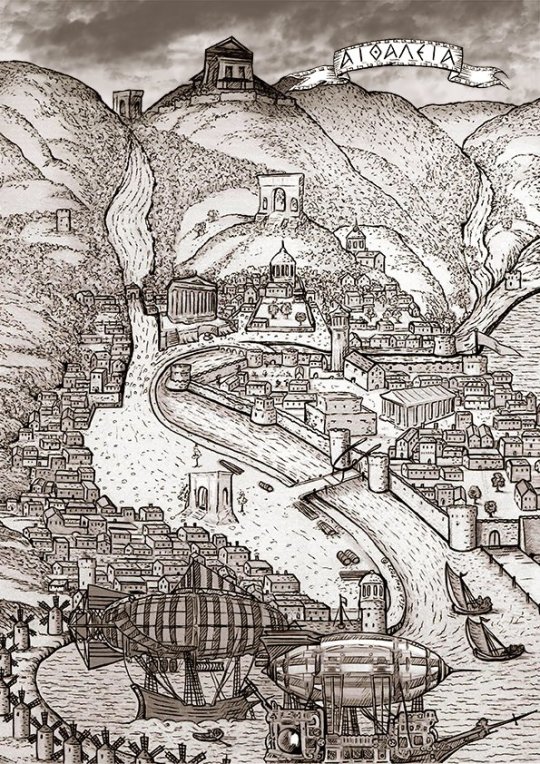
“Αιθάλεια Χώρα” , an ancient Greek-steampunk themed illustrated story by two Greek creators, Artemis Touli and Lila Kissa-Fragomichaliou. As it, perhaps, apparent, the island is inspired by the Greek island of Chios
38 notes
·
View notes
Text
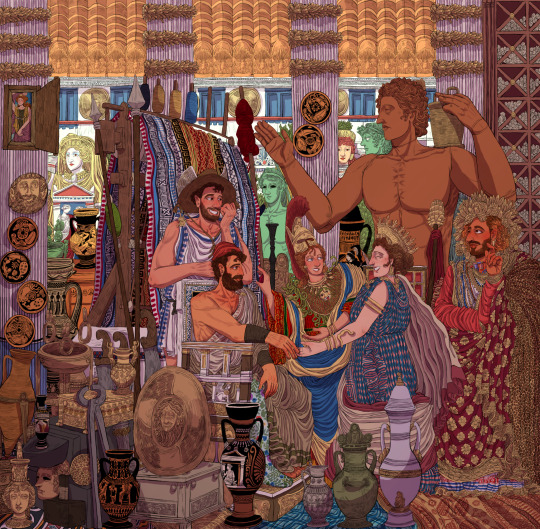
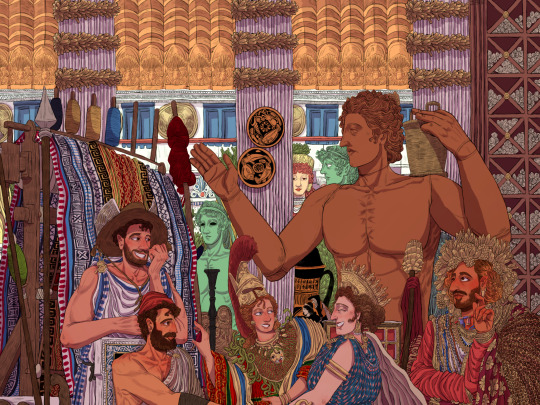
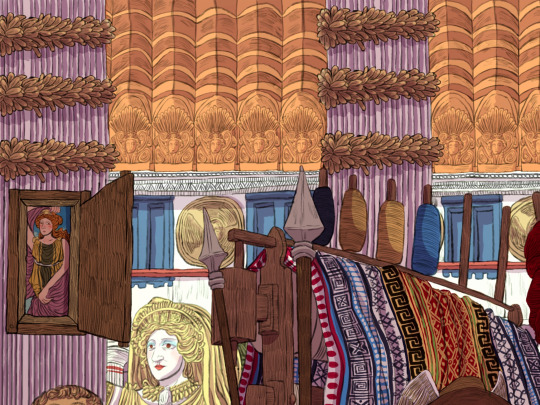
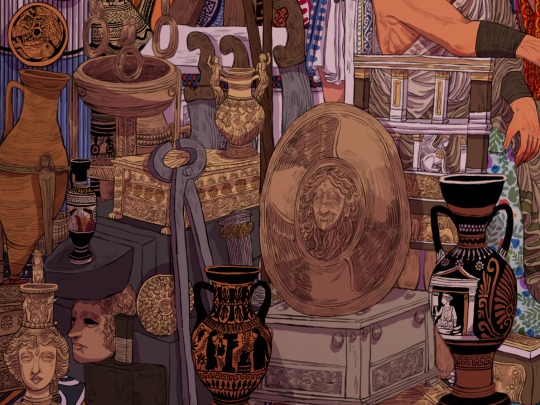
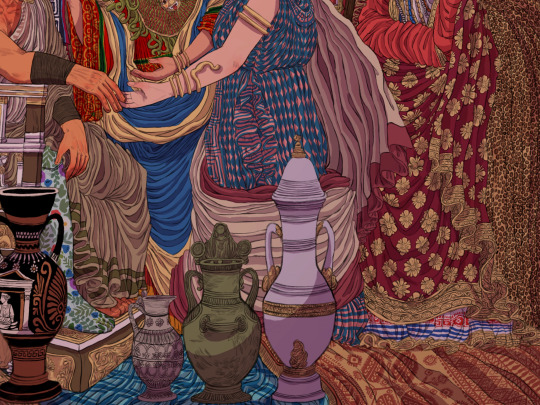
At the creative workshop of Athena and Hephaestus 🏛🔥✨🦉
434 notes
·
View notes
Note
Correct me if I am wrong but did ancient civilizations like Egypt, Greece, Rome, Persia were more developed than medieval times? Like there was a balance between religion and science and these two coexisted more easily than later times??
I think it somehow comes down to the differences between polytheism and monotheism. I think polytheists, exactly because they were polytheists, they were on average more open to alternative or additional interpretations of spirituality, nature and the world, the study of which leads to the evolution of the sciences. Polytheist religions also tend to be more "amoral": as both pure and malevolent deities are to be respected, if not worshipped. This creates a relative freedom regarding how a person can choose to act and evolve.
Monotheism is by nature more absolute because it is more vulnerable. When you have one God, it takes doubt for only one god for your entire religion to fall apart. That's why monotheist gospels are more precise and intolerant to alternative interpretations, even within the same religion. If scientists start spreading that nature works differently than the very specific way it is desribed to work like according to the One God, this is a huge threat that the monotheist religion can't work as easily around as a polytheist religion which might be like "okay maybe there is this another deity that wasn't revealed to us up to this point" or "okay maybe these two gods have given birth to a new god who explains all this". Obviously I am oversimplifying things but on average polytheist societies might have been better for people to inquire and search for answers.
Monotheism has a more solid and well defined mentality regarding morality - in theory, this is not a bad thing. But because, as I mentioned, monotheism is more vulnerable, the leaders of monotheist religions - who are flawed humans like everyone else, with the addition of power - gatekeep those concepts of morality in ways that are not even described in gospels, oppressing and limiting people so that the vulnerable religion will not be threatened and, by extension, their even more vulnerable powerful rank will also not be threatened. That's why monotheist medieval societies considered any attempt at an alternative interpretation of the world as a major threat to their very existence and in order to fight this, they put big obstacles at the progress of the sciences and the free expression in the arts.
These, of course, are the general conditions. There have been conflicts between polytheists or oppression from polytheists to monotheists (i.e Romans against early Christians, also because they felt threatened by the rapidly rising new religion) and there have been fields of human activity which flourished or kept flourishing during Middle Ages (agricultural innovations, technological advances, architecture and construction, printing revolution etc).
33 notes
·
View notes
Photo

I shall sing of Kythereia, born on Cyprus,
who brings sweet gifts to mortals, and whose lovely face
ever smiles radiant with lambent beauty on it.
Homeric Hymn 10 to Aphrodite, translated by Apostolos N. Athanassakis
I wanted so badly to color something, so have a Bronze Age Aphrodite on Cyprus.
435 notes
·
View notes